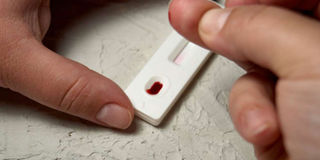Could HIV drug be answer to liver diseases?

Earlier in the year, WHO, recommended Rilpivirine to be administered as a once-a-month injection as a way to reduce the daily cocktail of antiretroviral pills in people with HIV and Aids. PHOTO | FOTOSEARCH
An antiretroviral HIV drug has been found to help in the repair of a scarred liver through drug repurposing.
Repurposed drugs are medications that have already been proven to be safe, and are used to treat a different condition from what they were made for. They sometimes provide a cheaper alternative to treatment.
Scientists from Valencia University in Spain have discovered that the antiretroviral, Rilpivirine — though not used in Kenya — can considerably address scarring of the organ, also known as fibrosis. This means it can reverse the damage of a liver that could not self-repair or function properly.
Earlier in the year, WHO, recommended Rilpivirine to be administered as a once-a-month injection as a way to reduce the daily cocktail of antiretroviral pills in people with HIV and Aids.
The drug, the research shows, works by promoting growth and regeneration of the second largest organ in the body which controls most chemical levels in the blood.
It secretes bile which helps to break down fats ahead of their digestion and absorption. The liver also breaks down medicines in the blood into forms that are easier for the body to use.
Liver scarring is caused by surgery of the organ, alcohol abuse, fat accumulation in the liver, and viral hepatitis B or C. On the latter, the viral hepatitis affects more than 71 million people in Sub-Saharan Africa, shows the WHO viral scorecard launched in June.
Scar tissue blocks or limits the flow of blood and kills healthy liver cells. Therefore, such livers tend to become hard or stiff. If untreated, this can progress to liver cirrhosis and/or cancer and requires a transplant, which is costly.
The research offers a glimmer of hope for new, easily available, therapies for liver diseases “due to its growing prevalence and the lack of effective therapeutic options”, says the study, published in the Gut journal of the British Society of Gastroenterology.
“The protective effect of this drug has been confirmed from published databases on patients infected with HIV and treated with different antiretroviral regimens, which shows that patients treated with this medicine show an improved liver function,” says the study coordinated by one of the researchers Ana Blas-García.
For HIV treatment, the antiretroviral drug works by blocking the virus from replicating in the body. This is because when HIV infects a cell, it forces the cell to make many more copies of the virus a process that requires proteins called enzymes. One of these enzymes is called reverse transcriptase, which is used by HIV-infected cells to make copies of the virus. Rilpivirine reduced the activity of the enzyme and hence the HIV-infected cells produce less HIV.


